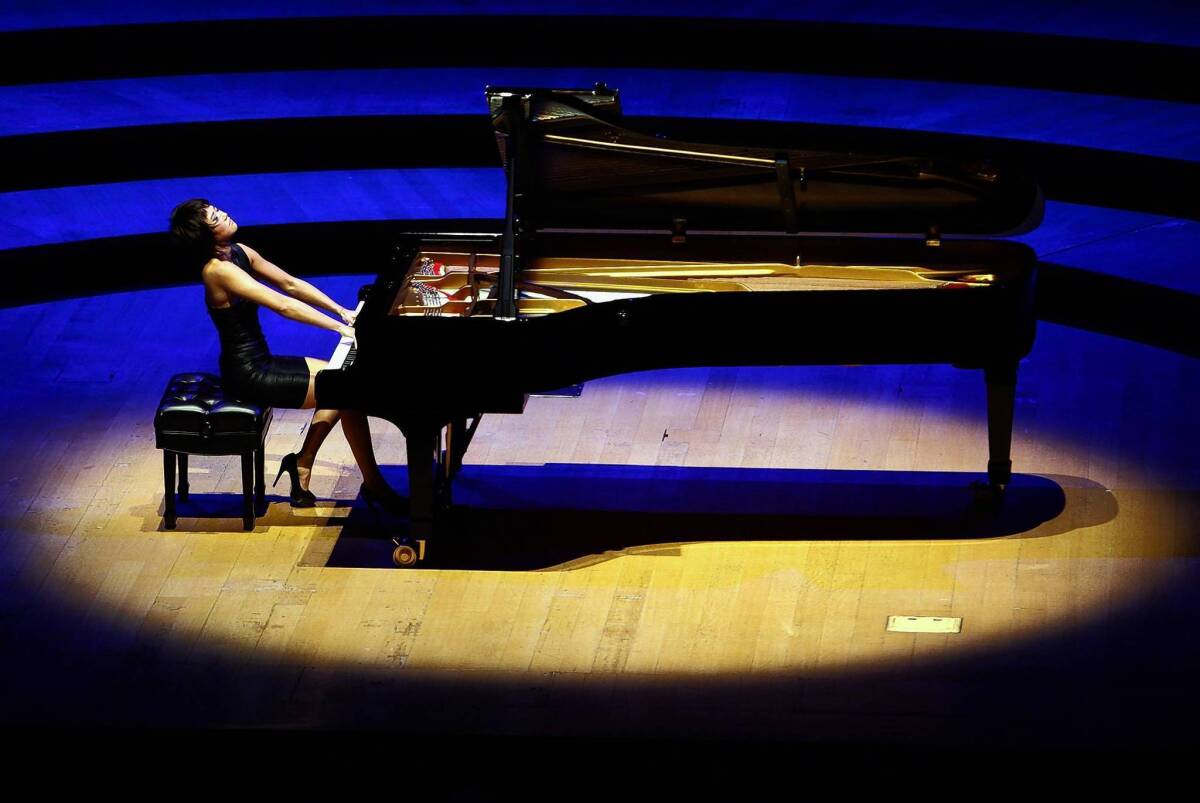Music review: Yuja Wang inspires wonder at Disney Hall

- Share via
Yuja Wang is a wonder. Having proved a sensation as soloist with the Los Angeles Philharmonic at both Walt Disney Concert Hall and the Hollywood Bowl, the 26-year-old Chinese pianist finally made her recital debut at Disney on Sunday night. Again a sensation, she displayed degrees of speed, agility and strength that may have been in violation of gravity’s laws.
Nor did Wang shy from her notable high style. She wore nearly identical tube-tight dresses — black for Scriabin, bright red for Rachmaninoff — as though a Bond girl who was also Houdini and Horowitz rolled into one, in her demonstration of startling dexterity despite physical restraints. Towering high heels didn’t hamper her deft pedaling, no matter what Newtonian mechanics might otherwise suggest. A near wardrobe malfunction hardly fazed her.
She filled the hall, thrilled the crowd and attracted a long line of more than 200 fans waiting for her to sign CDs after the concert. One of the town’s best and most admired pianists said in awe as he left the hall, “I used to be a pianist.”
CRITIC’S NOTEBOOK: Yuja Wang, dressed to kill
Still, Wang does more than inspire wonder, she can also make one wonder. For all her considerable flash, she appears shy in the way she purposefully strides onto the stage, bows curtly and rarely smiles, as if in a desperate hurry to reach the safety of the keyboard. Once seated at her instrument, she is armed and in control. All signs of vulnerability vanish, and she plays to impress. Hers becomes, at least in part, the spectacle of an Olympic athlete.
But I want to put aside the phenomenon of Wang’s flying fingers and concentrate on her quiet side, which I think is the real heart of her playing and her best hope for artistic maturity. Her program Sunday was, with the exception of Ravel’s “La Valse,” Russian, requiring virtuosity but demanding sensitivity.
She began with two mystical sonatas by Scriabin. Making a last-minute replacement, she dropped Debussy’s cool “Pour le Piano” in favor of Scriabin’s emotionally hot Sonata No. 2 and followed that with his terrifying No. 6.
“When I first became involved with Scriabin’s music,” the introspective Russian pianist Yevgeny Subdin writes in the notes to his 2007 recording of the Scriabin Second, he found it “almost like a type of lust” that wouldn’t subside. Grant Hiroshima’s program notes for Wang’s recital remind us that Scriabin himself used such terms as “nightmarish,” “fuliginous,” “murky,” “dark and hidden,” “unclean” and “mischievous” to describe the eerily seductive Sixth Sonata.
She dresses the part, but Wang is not a seductive pianist. Her playing is decidedly not unclean nor is it obscure. Lust is not something she shares with her listeners.
PHOTOS: Yuja Wang and the L.A. Philharminoc
Wang played Scriabin for beauty and thrills. The thrills were thrills, no more and no less. Her tone is curiously unsaturated, without much color. What it does have is a pristine purity, and for the calm opening of the Second Sonata, Wang achieved stunning stillness.
The Sixth Sonata has the ability to give you the creeps. An ascending line keeps coming back to get you and all those trills have a way of getting under your skin. Wang’s virtuosic performance gave the impression of bells ringing, which I think the bell-besotted Scriabin would have liked very much. But she also raced through the sonata, treating it as something to be so fully mastered that it might lose its power to corrupt the spirit with its huge portions of musical decadence.
Ravel’s “La Valse,” which followed, is more corruption, revealing the effects of the waltz gone mad. Wang played it like the dickens, but with a coldly detached eye.
The Rachmaninoff set after intermission included three short pieces — an elegy, a Moment Musical and an arrangement from Mendelssohn’s “A Midsummer Night’s Dream” — followed by the big Second Sonata. Again Wang amazed most when she didn’t amaze. That is to say the flamboyantly fast passages did more wowing than wooing. Yet when she skimmed the keyboard in Rachmaninoff’s version of Mendelssohn or lingered on the lyric theme of the sonata’s first movement, Wang began to let her defenses down and transcend her transcendent technique.
The encores were Prokofiev’s Toccata, Horowitz’s “Carmen” arrangement, Chopin’s Waltz in C-sharp minor and an arrangement from Rossini’s “Barber of Seville.” They dazzled, the Prokofiev to the point of distortion. In Chopin, though, Wang achieved a crystalline transparency that offered one last fleeting glimpse of a potential inner greatness that may take awhile — and many more wardrobes — before fully emerging.
MORE
INTERACTIVE: Christopher Hawthorne’s On the Boulevards
Depictions of violence in theater and more
PHOTOS: Arts and culture in pictures
More to Read
The biggest entertainment stories
Get our big stories about Hollywood, film, television, music, arts, culture and more right in your inbox as soon as they publish.
You may occasionally receive promotional content from the Los Angeles Times.











